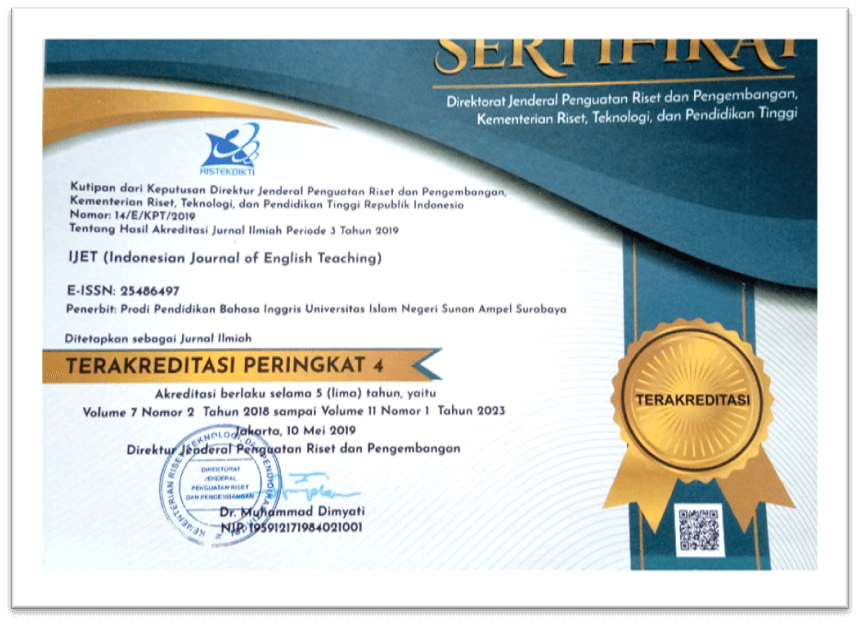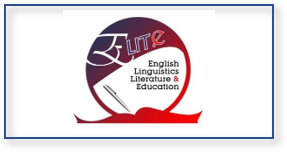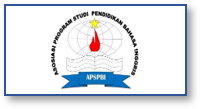Identifying English Language Needs of Religious Guides at The General Presidency of The Grand Mosque and Prophet’s Mosque
DOI:
https://doi.org/10.15642/ijet2.2021.10.2.255-284Keywords:
English for religious purposes, ESP, needs analysis, religious guides, Saudi ArabiaAbstract
The aim of this study is to identify English language needs for religious guides at The General Presidency of The Grand Mosque and Prophet’s Mosque. This study adopted a quantitative approach methodology using needs analysis questionnaire. The quantitative data collection instrument was a questionnaire with (51) participants. SPSS was used as the quantitative data analysis method. Findings showed that listening and speaking were the most important skills, and reading was moderately important, while writing is not important at all. Also, English is greatly rated as a tool to effectively perform their tasks in term of preaching and advising guests and pilgrims. Difficulties are embodied in lacking English language, accents, and proper religious expressions and vocabulary. This study highlights an urgent need for English for Religious Purposes. The study proposes a general guideline for a course design framework based on participants’ needs.
Downloads
References
Abudhahir, R. A., Mahdun, M., & Nor, R. M. (2015). Need Analysis and Material Development in English for Specific Purposes in Relation to English for Islamic Studies. Journal of Management & Muamalah, 5(2).
Ahmad, N., & Khushi, Q. (2014). An Analysis of Religious Scholars’ Needs for Reading Religious Texts Written in English. Pakistan Journal of Islamic Research, 14(14), 113-121.
Aldohon, H. I. (2014). English for specific purposes (ESP) for Jordanian tourist police in their workplace: Needs and problems. International Education Studies, 7(11). https://doi.org/10.5539/ies.v7n11p56
Al-Gorashi, A. K. (1988). The English communication needs of military cadets in Saudi Arabia as perceived by junior officers in the Saudi Army and air defense [Unpublished doctoral dissertation]. Indiana University.
Alhamami, M. (2020). Language barriers in multilingual Saudi hospitals: Causes, consequences, and solutions. International Journal of Multilingualism, 17(2), 1-13. https://doi.org/10.1080/14790718.2020.1777134
Alhuqbani, M. B. (2008). Identifying the English Language Needs of Saudi Police Officers. Journal of the Saudi Association of Languages and Translation, 1(2), 55-97.
Bhatia, V. K. (2015). Critical genre analysis. Hermes - Journal of Language and Communication in Business, 54, 9-20. https://doi.org/10.4324/9781315690315
Brown, J. D. (2009). Foreign and second language needs analysis. In M. H. Long, & C, Doughty (Eds.), The handbook of language teaching (pp. 269-293). Wiley-Blackwell.
Brown, J. D. (2016). Introducing needs analysis and English for specific purposes. Routledge.
Chambers, F. (1980). A re-evaluation of needs analysis in ESP. The ESP Journal, 1(1), 25-33. https://doi.org/10.1016/0272-2380(80)90007-4
Dudley-Evans, T., John, M. J., & John, M. J. (1998). Developments in English for specific purposes: A multi-disciplinary approach. Cambridge University Press.
Hutchinson, T., & Waters, A. (1987). English for specific purposes. Cambridge University Press.
Jordan, R. R. (1997). English for academic purposes: A guide and resource book for teachers. Cambridge University Press.
Juhary, J. B. (2013). Using Military Vocabulary and Concepts for Successful Language Learning at the Defence University. Literacy Information and Computer Education Journal, 4(3).
Muhammad, I., & Halim Abdul Raof, A. (2019). Assessing the ESP needs of Saudi engineering undergraduates: A diagnostic view. Arab World English Journal, 10(4), 204-222. https://doi.org/10.24093/awej/vol10no4.16
Munby, J. (1981). Communicative syllabus design: A sociolinguistic model for designing the content of purpose-specific language programmes. Cambridge University Press.?
Richterich, R., & Chancerel, J. (1980). Identifying the needs of adults learning a foreign language. Pergamon Press.
Robinson, R. (1991). ESP Today: A Practitioner’s Guide. Hemel Hempstead. Prentice Hall.
Sahiba, A., & Mirza, A. A. (2019). Investigating students’ belief toward the importance of English learning for dakwah activity at IAIN Palangka Raya. In The 3rd INACELT (International Conference on English Language Teaching). Institut Agama Islam Negeri (IAIN) Palangka Raya Indonesia.
Samer, A. K. (2014). Spoken English for Saudi Hajj volunteers: A need assessment [Unpublished master's thesis]. Spoken English for Saudi Hajj volunteers: A need assessment.
Sayed Abudhahir, R. A., & Mohamad Ali, A. (2018). English for Islamic studies: Should I learn English? – From the eyes of Islamic studies students. LSP International Journal, 5(1). https://doi.org/10.11113/lspi.v5n1.65
Swales, J. M. (1990). Discourse analysis in professional contexts. Annual Review of Applied Linguistics, 11, 103-114. https://doi.org/10.1017/s0267190500001987
Tarihoran, N., & R. (2019). Exploring the Islamic culture in English for Islamic studies (EIS) classroom. Proceedings of the 4th ASEAN Conference on Psychology, Counselling, and Humanities (ACPCH 2018). https://doi.org/10.2991/acpch-18.2019.3
West, R. (1994). Needs analysis in language teaching. Language Teaching, 27(1), 1-19. https://doi.org/10.1017/s0261444800007527










